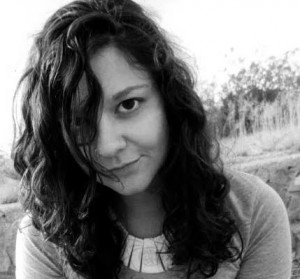Bkclb is a cool new way to buy eBooks

I’m a big fan of anything that has to do with publishing but ISN’T publishing (like Submittable and Vouched), so naturally I was intrigued by Bkclb, a new and Australian eBook seller that’s geared directly toward indie lit. I started using them for PGP books and I really like everything about it. Shit don’t cost too much. They got the new Lifted Brow and some Dzanc Books and this Sententia book that’s all the rage.
I asked Connor Tomas O’Brien, who runs the show over there, a bunch of questions a while ago (see below) and now Bkclb is coming out of Beta, so to celebrate checkitout: go here, enter “HTMLGiantSux” and you can get the eBook of Timothy Willis Sanders’s excellent Orange Juice for free. Try it out, see what you think, say what you think in the comment box below, provided by Disqus, here’s the what why when who how: READ MORE >
Tyler Malone, The Mad Marksonite

David Markson, the talented writer of numerous literary masterpieces, died on June 4th, 2010. Soon after his death, in accordance with his wishes, his entire collection of books was donated to The Strand (supposedly his favorite place in the world). After this fact was inadvertently discovered by Annecy Liddell, who stumbled upon Markson’s copy of Don DeLillo’s White Noise in the stacks, it became a sort of underground NYC literature-lover exercise to scour the stacks of The Strand for books the man once owned.
…
The Strand is pretty much out of any Markson-owned books now, the hunt is officially over. Not too long ago I was told by a worker at The Strand that he is fairly positive that I own more than double the amount of Markson-owned books of any other Markson Treasure Hunter. I have around 250 or so of his books. And here, once a day, I plan to share some of his marginalia. Please join me in reading Markson reading…
Reading Markson Reading
Curbside Romance
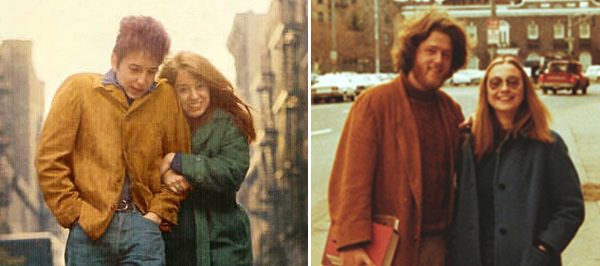
Suze Rotolo, who appeared on the cover The Freewheelin’ Bob Dylan (1963) was Bob Dylan’s girlfriend between 1961-1964, but because he’s an artist, is considered a muse. That muse is merely love’s exacerbation may be the most sneaky euphemism of all. “Don’t think twice, It’s alright,” whose damn cold lyrics include I ain’t saying you treated me unkind / You could have done better but I don’t mind / You just kinda wasted my precious time was written in emotional defiance over Suze’s considering moving to Italy permanently. We’ve all done this before: diminished someone’s feelings on behalf of our own. He knocked her up, she had an abortion, they broke up. Some years later, in 1971, another couple appeared under fateful film, this time in New Haven Connecticut via Yale. They were both law students destined for politics, both of whose word bending and rhetorical capacities, if not imperatives, give both philosophy and creative writing a useful and more utilitarian poke. One remembers Clinton’s “it depends on what the meaning of the word is, is” as he dug a hole straight into phenomenological territory. The Heideggerian “is,” it turns out, was just sex, the milkshake of human civilization. The president blew a stressed-out wad on an intern, a projectile as morally devastating to this country as a few planes some years later. Suze indeed moves to Italy and marries an Italian director. In his follow-up album, The Songs of Bob Dylan, recorded in a single evening in June of 1964, Dylan would recount his falling out with her in “The Ballad of Plain D,” succinctly beginning with I once loved a girl… only to continue, verse after verse, for a treacherous 8:18 min. It is unlikely that Bill and Hillary got dressed up that day, coordinated in a suede and green jacket, in the fashion of an album cover. It is also unlikely that they knew they would almost change the world by simply trying to. A cynic will tell you the election is an illusion of choice, which is why cynics are rarely remembered. The greatest muse is history as it happens, the notion of one’s part in it. On Tuesday November 6, 2012, in the spirit of American antagonism, people will vote against their enemies all the while imagining themselves standing by each other, or better yet leaning in.
DIED Snippet: On September 14, chronic illness legal advocate Jennifer Jaff passed away. Her advocacy was a reaction to her own diagnosis with Crohn’s disease. Frankly, I don’t even know where to begin talking about the messy maze of health insurance and chronic illness or pre-existing conditions. But I thought this might be a fine place to link to Giant contributor Ken Baumann’s essay on his Crohn’s in Vice Magazine. (And to mention that they have his name spelled wrong in the byline.)(Also, this essay is not sexist.)
Fear, Loathing, and Comics

Comic book artist, Ed Piskor
If you’re walking the streets of Pittsburgh at night, be prepared to encounter an intimidating gang of comic book artists. There’s Ed Piskor, who wears sunglasses indoors, has a different Public Enemy t-shirt for every day of the week, and who Rolling Stone calls “the next big thing in books”. There’s Tom Scioli, who stutters a tad with delight when retrieving a comics-related file from his encyclopedic mind, and whose work on Godland and American Barbarian is compared to that of the eminent, Jack Kirby. Then there’s indie artist, Jim Rugg, whose books Street Angel and the Eisner-nominated Afrodisiac have made big waves in the small press scene. He also co-hosts a podcast called Tell Me Something I Don’t Know with artist, Jasen Lex. BFFs since college, they grill folks, such as Hellboy’s Mike Mignola, on what it means to live and work as an artist.
If these guys are excited about something, so am I. So when they invited me to film them at a “special event”, I jumped at the opportunity. Then they told me the shoot would take place in a subterranean warehouse in the middle of nowhere.
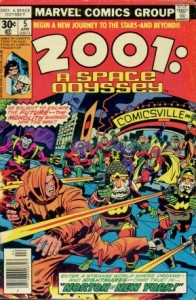
Jack Kirby’s 2001 series, in the basement
“No, you see, this basement is legendary,” they said.
This Isn’t Really an Interview: Robert Alan Wendeborn Talks to Dan Magers and Carrie Murphy About Their New Books
Robert Alan Wendeborn: So, first I guess I want you two to say something about yourselves, intro or whatever…
Dan Magers: Carrie do you want to go first?
Carrie Murphy: haha sure
what do you mean, robbie?
like a mini bio or like a funny fact or something?
RW: um, introduce yourself
mini bio
on the fly
CM: ok, i’m carrie murphy, i wrote a book called Pretty Tilt, from keyhole press, i’m from Baltimore, MD, i got my MFA (with robbie) at nmsu in las cruces NM
Invent your monsters sparingly: a conversation with Ned Vizzini
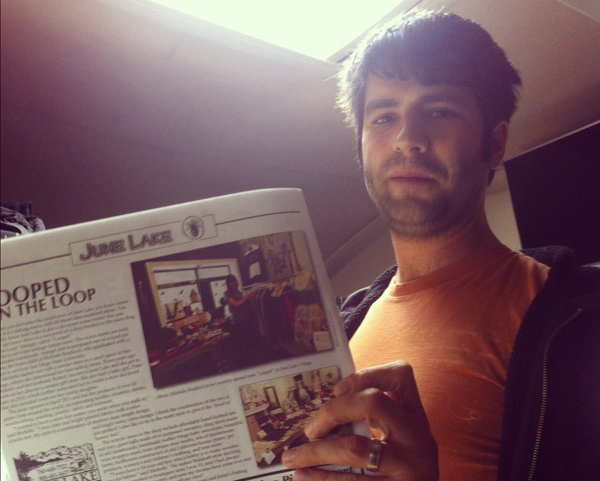
I sat down with Ned on a Saturday. He was feeling rough, having consumed something gnarly at a dinner party the night before in an incredibly storied Hollywood Hills house. Soon after this interview, he was struck with food poisoning. Ned’s a busy guy: his book, The Other Normals, comes out today, and the TV show he writes for with Nick Antosca, Last Resort, premieres in two days. He’s also working on a movie with Nick called Woogles, and writing a series of middle grade novels with Chris Columbus (of Harry Potter fame). And he’s a relatively new dad. Below is a transcript of our conversation, Ned drinking down gut-calming tea…
I’ve known you since you first came to LA, and I wanna know if there was any event in particular that coincided with you starting this book.
Yeah. There were two things about a decade apart. One was towards the end of high school. I was out with some friends, hanging out in the park. And I hung out with a lot of Russian kids in high school. And I had a shorter, more wily Russian friend, who’s in my first book. His name is Owen. I also had a taller, bigger, more militaristic—
A Dolph Lundgren?
In that vein. He ended up joining the military. He’s the person who told me that the US military still trains against the Russians, that when you’re doing an exercise in the military, you’re still—
Fighting the commies.
Yes. And I asked him why, and he said, “Because we’re the baddest motherfuckers around.” READ MORE >
Henry Kissinger on Writing
“Power is the great aphrodisiac.”
“Even a paranoid can have enemies.”
“Universal rule, to last, needs to translate force into obligation.”
“Multiple contests take place simultaneously in different regions of the board.”
“There are no isolated events.”
“Every civilization that has ever existed has ultimately collapsed.”
“The real distinction is between those who adapt their purposes to reality and those who seek to mold reality in the light of their purposes.”
“Each success only buys an admission ticket to a more difficult problem.”
“It is barely conceivable that there are people who like war.”
“I’ve always acted alone. Americans like that immensely.”
“The absence of alternatives clears the mind marvelously.”
“If you believe that their real intention is to kill you, it isn’t unreasonable to believe that they would lie to you.”
“Clausewitz’s famous dictum that war is a continuation of diplomacy by other means defines both the challenge and the limits of diplomacy.”
“Given the pace of technology, patience can easily turn into evasion.”
“Victory over the insurgency is the only meaningful exit strategy.”
The consolation of Frederick Exley’s grief (Briefly)
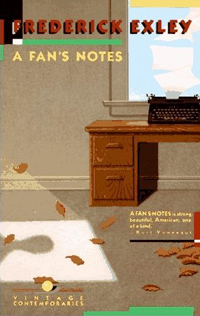 A Fan’s Notes
A Fan’s Notes
by Frederick Exley
Vintage, 1988
385 pages / $16 Buy from Amazon
Though not a formal review per se—a sort of dependency on the author renders me useless to approach it in some Kakutanian format to perhaps bring a notion of what will follow when the pages are opened up and the narrative begins—I still cannot think of a novel better to be explored in a few hundred words that affected me of late than Frederick Exley’s A Fan’s Notes.
Tending to be referred to as the go-to novel for lost undergraduates (guilty, it should be admitted early on), Exley’s masterpiece is the first in a trilogy of roman a clef works of fiction describing the life of a character named Frederick Exley, who’s seen largely the same things as its author—the two books that follow are Pages From a Cold Island and Last Notes From Home; both equally as triumphant as their predecessor and in true fanatical circles are thought of as the middle and last works in an omnibus rather than a separate and lesser force than the original. I came upon Exley in the fall, which any avid fan will acknowledge is the perfect time to discover him, as much of the novel’s emphasis is on the impact of football—more pointedly, the Giants in the Frank Gifford era—on its protagonist and essentially describes him losing his mind over both a love of the game and of literature. Throughout the narrative it’s as common to have a random digression into a description of the college years of Gifford at USC—they, Exley and Gifford, attended at the same time and were lightly acquainted—as it is for him to cite the letters and journals of F. Scott Fitzgerald losing his mind when Zelda found herself bound up in an insane asylum.
September 24th, 2012 / 12:00 pm

